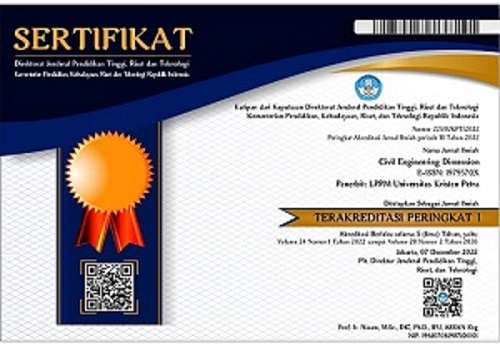THE INFLUENCE OF MOLDING WATER CONTENT AND LIME CONTENT ON THE STRENGTH OF STABILIZED SOIL WITH LIME AND RICE HUSK ASH
 :
:
https://doi.org/10.9744/ced.7.1.pp.%201-5
Keywords:
soil stabilization, molded water content, lime, rice husk ash, unconfined compressive strength.Abstract
The strength gain of stabilized soils is not only influenced by the type and proportion of the stabilizers and its curing time, but also by the water content needed to maintain the reaction. The reaction of lime – RHA with soil is pozzolanic. Hence, the process will be subjected greatly by the amount of water to react with admixtures and the proportion of the stabilizer. This paper presents the result of a laboratory study on the unconfined compressive strength (UCS) of soils stabilized with lime and RHA, compacted at the OMC, and at the dry and wet side of OMC. The amount of lime required for stabilization (LRS) is determined by Eades and Grim's Method. The results showed that the water content determines the UCS characteristics of unstabilized and stabilized soils. The UCS of stabilized soils decreased with increasing molding water content, but it is still higher than of the un-stabilized soils. In general, higher lime content results to a higher UCS. The maximum strength of the stabilized soil is attained at lime/RHA ratio of 1/2. The UCS of the stabilized soil increased significantly about 7 – 9 times to the un-stabilized UCS.Downloads
Published
2005-03-31
How to Cite
Muntohar, A. S. (2005). THE INFLUENCE OF MOLDING WATER CONTENT AND LIME CONTENT ON THE STRENGTH OF STABILIZED SOIL WITH LIME AND RICE HUSK ASH. Civil Engineering Dimension, 7(1), pp. 1-5. https://doi.org/10.9744/ced.7.1.pp. 1-5
Issue
Section
Articles
License
Authors who publish with this journal agree to the following terms:- Authors retain the copyright and publishing right, and grant the journal right of first publication with the work simultaneously licensed under a Creative Commons Attribution License that allows others to share the work with an acknowledgement of the work's authorship and initial publication in this journal.
- Authors are able to enter into separate, additional contractual arrangements for the non-exclusive distribution of the journal's published version of the work (e.g., post it to an institutional repository or publish it in a book), with an acknowledgement of its initial publication in this journal.
- Authors are permitted and encouraged to post their work online (e.g., in institutional repositories or on their website) followingthe publication of the article, as it can lead to productive exchanges, as well as earlier and greater citation of published work (See The Effect of Open Access).
















